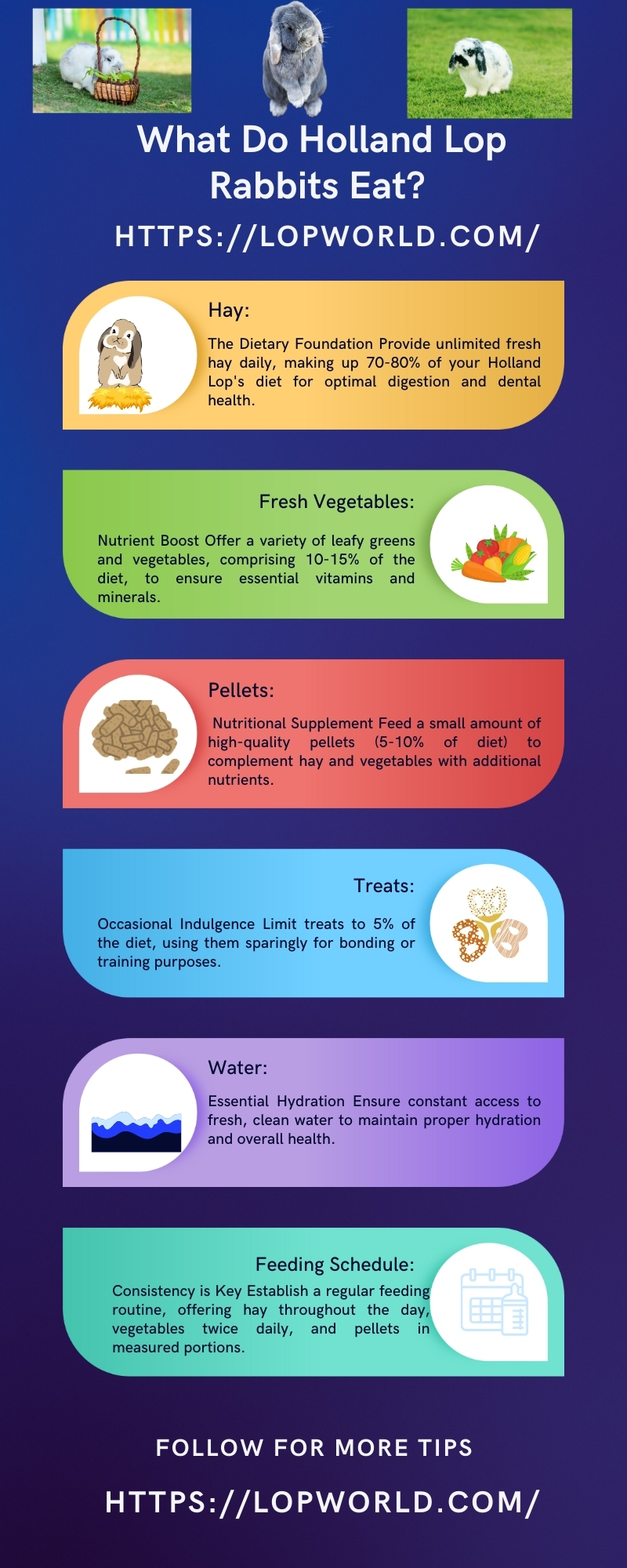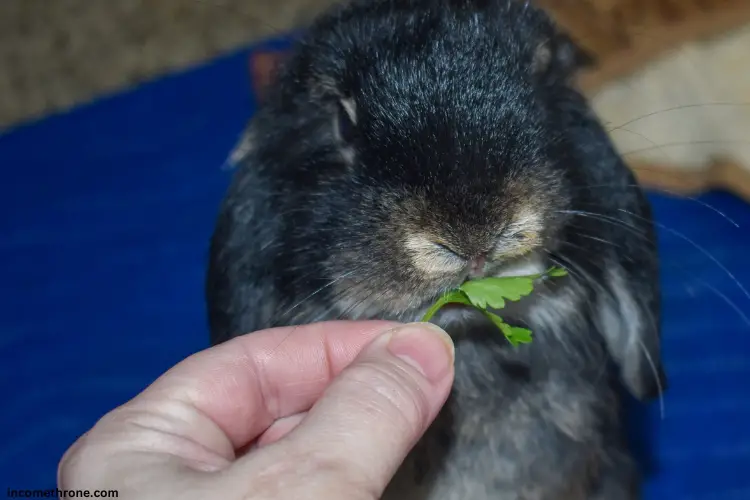Holland Lop rabbits are beloved pets known for their adorable floppy ears and compact size. As a responsible rabbit owner, understanding their dietary needs is crucial for their health and longevity.
This guide will explore the ideal diet for Holland Lop rabbits, focusing on their nutritional requirements, recommended foods, and feeding practices.
The Importance of a Proper Diet for Holland Lop Rabbits
A balanced diet is essential for Holland Lop rabbits to maintain:
- Optimal health
- Proper digestion
- Healthy teeth
- Strong bones
- Shiny coat
- Overall well-being
Providing the right nutrition can prevent common health issues and ensure your furry friend lives a happy, active life.
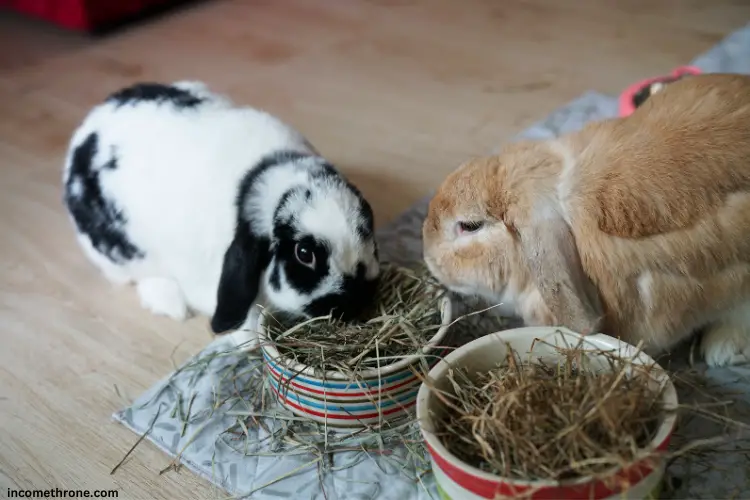
Core Components of a Holland Lop Rabbit’s Diet
1. Hay: The Foundation of Rabbit Nutrition
Hay is the most crucial component of a Holland Lop rabbit’s diet. It should make up about 70-80% of their daily food intake. Here’s why hay is so important:
- Promotes healthy digestion
- Keeps teeth trimmed and healthy
- Provides essential fiber
- Encourages natural foraging behavior
Types of Hay for Holland Lop Rabbits
| Hay Type | Benefits | Recommended Age |
|---|---|---|
| Timothy Hay | High in fiber, low in protein and calcium | Adult rabbits |
| Orchard Grass | Good alternative to Timothy, similar nutritional profile | All ages |
| Meadow Hay | Variety of grasses, good for enrichment | All ages |
| Alfalfa Hay | High in protein and calcium | Young, pregnant, or nursing rabbits |
Offer fresh hay daily and ensure it’s always available to your Holland Lop rabbit.
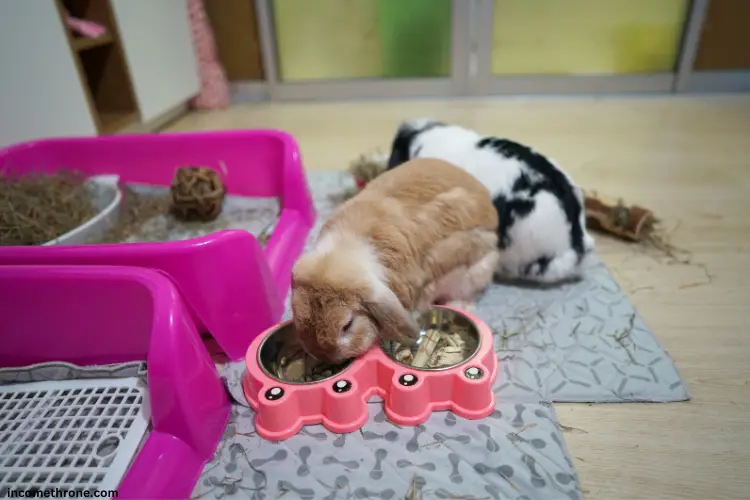
2. Fresh Vegetables: Essential Nutrients and Variety
Fresh vegetables should constitute about 10-15% of your Holland Lop’s diet. They provide essential vitamins, minerals, and hydration. Introduce new vegetables gradually to avoid digestive upset.
Recommended Vegetables for Holland Lop Rabbits:
- Romaine lettuce
- Carrot tops
- Cilantro
- Parsley
- Cucumber
- Bell peppers
- Bok choy
- Kale (in moderation)
- Spinach (in moderation)
Aim to provide a variety of at least 3-4 different vegetables daily, offering about 1 cup per 2 pounds of body weight.
3. Pellets: Supplemental Nutrition
While not as crucial as hay and vegetables, pellets can provide additional nutrients for Holland Lop rabbits. They should make up about 5-10% of the diet for adult rabbits.
Choosing the Right Pellets:
- Look for plain, high-fiber pellets
- Avoid muesli-style mixes with added seeds or dried fruits
- Opt for timothy-based pellets for adult rabbits
- Alfalfa-based pellets are suitable for young, growing rabbits
Feed approximately 1/8 to 1/4 cup of pellets per 5 pounds of body weight daily.
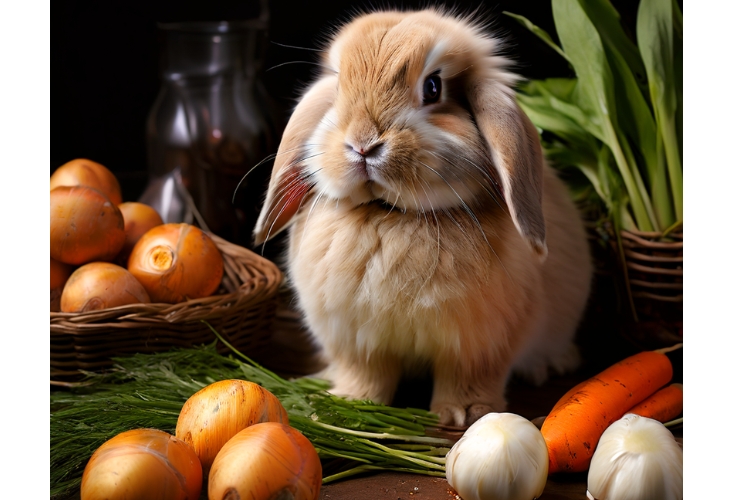
4. Treats: Occasional Indulgences
Treats should be given sparingly, making up no more than 5% of your Holland Lop’s diet. They can be used for bonding, training, or as occasional rewards.
Safe Treats for Holland Lop Rabbits:
- Small pieces of fruit (apple, banana, berries)
- Dried herbs
- Small amounts of carrots
- Commercial rabbit treats (in moderation)
Remember, treats are not essential and should never replace the core components of their diet.
Foods to Avoid
To keep your Holland Lop rabbit healthy, avoid feeding them the following:
- Chocolate
- Avocado
- Onions
- Garlic
- Bread
- Nuts
- Seeds
- Corn
- Beans
- Potatoes
- Rhubarb
- Iceberg lettuce
These foods can be harmful or even toxic to rabbits and should never be offered.
Feeding Schedule for Holland Lop Rabbits
Establishing a consistent feeding schedule helps maintain your rabbit’s digestive health and prevents obesity. Here’s a sample schedule:
- Morning:
- Refresh hay supply
- Offer a small portion of pellets
- Provide fresh water
- Midday:
- Check hay and replenish if needed
- Offer half of the daily vegetable portion
- Evening:
- Refresh hay again
- Offer the remaining vegetable portion
- Provide a small number of pellets if needed
- Night:
- Ensure hay is available for overnight grazing
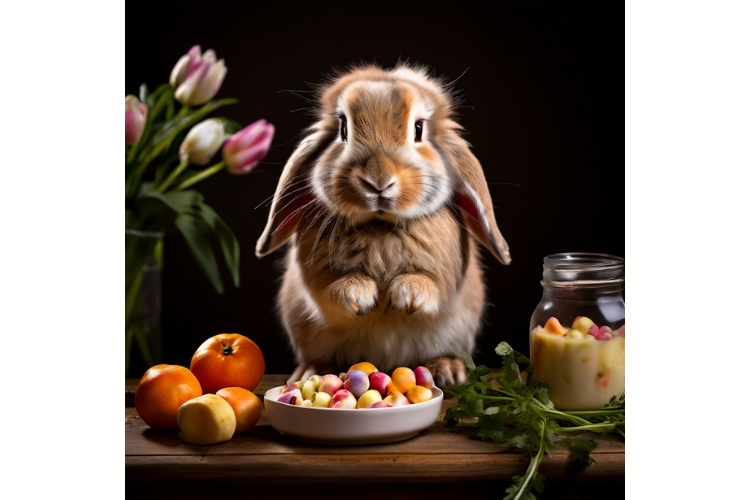
Special Dietary Considerations
Young Holland Lop Rabbits
Young rabbits under 7 months have different nutritional needs:
- Higher protein requirements
- Can have unlimited pellets
- Alfalfa hay is suitable
- Introduce vegetables gradually after 12 weeks
Pregnant or Nursing Holland Lop Rabbits
Pregnant or nursing rabbits need extra nutrition:
- Increased pellet intake
- Access to alfalfa hay
- Additional calcium-rich vegetables
Senior Holland Lop Rabbits
Older rabbits may require dietary adjustments:
- Increased fiber intake
- Reduced pellet portions
- Softer vegetables if dental issues are present
Hydration: The Often Overlooked Nutrient
Water is crucial for Holland Lop rabbits. Ensure fresh, clean water is always available. Some tips for proper hydration:
- Use a heavy ceramic bowl to prevent tipping
- Clean and refill water containers daily
- Consider offering a water bottle as an alternative
- Monitor water intake, as changes can indicate health issues
Transitioning to a New Diet
When changing your Holland Lop’s diet, do so gradually over 2-3 weeks to avoid digestive upset. This applies to introducing new foods or switching pellet brands.
Signs of a Healthy Diet
A well-fed Holland Lop rabbit will display:
- Bright, clear eyes
- Soft, shiny coat
- Active and alert behavior
- Regular, well-formed droppings
- Healthy weight and body condition
Common Dietary Issues and Solutions
- Obesity:
- Reduce pellet intake
- Increase hay consumption
- Ensure regular exercise
- Dental Problems:
- Provide ample hay for natural wear
- Offer wooden chew toys
- Regular dental check-ups
- Gastrointestinal Stasis:
- Maintain high-fiber diet
- Ensure proper hydration
- Seek veterinary care if symptoms persist
Conclusion
Providing a balanced, nutritious diet is key to keeping your Holland Lop rabbit healthy and happy. Remember that hay should form the foundation of their diet, supplemented with fresh vegetables, a small number of pellets, and occasional treats. Always introduce new foods gradually and consult with a rabbit-savvy veterinarian if you have concerns about your pet’s diet or health.
By following these guidelines, you’ll ensure your Holland Lop rabbit receives the nutrition they need to thrive. A well-fed rabbit is a happy rabbit, and with proper care, your furry friend can be a joyful companion for years to come.
